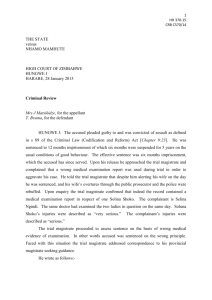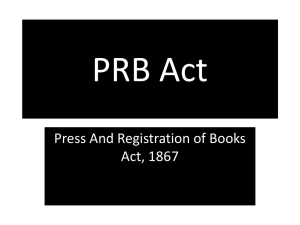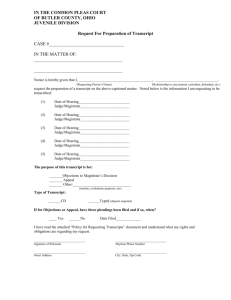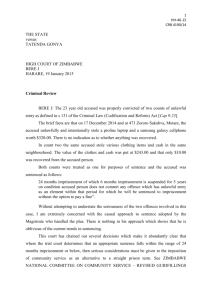Security Cases - Delhi High Court
advertisement
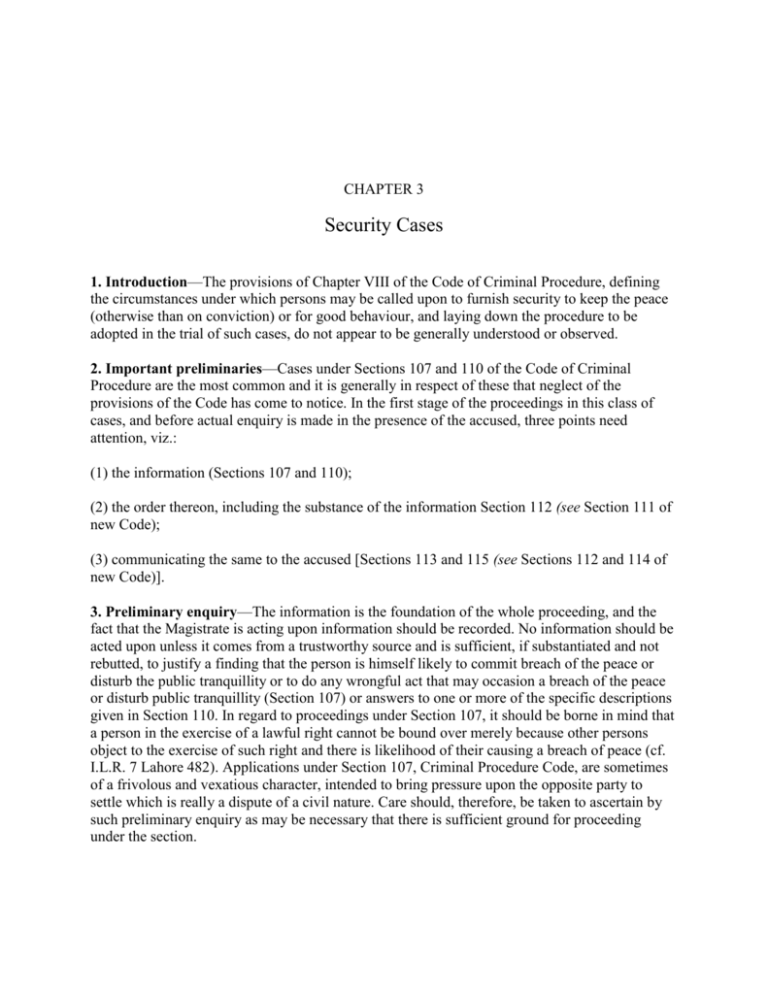
CHAPTER 3 Security Cases Ch. 3] 1. Introduction—The provisions of Chapter VIII of the Code of Criminal Procedure, defining the circumstances under which persons may be called upon to furnish security to keep the peace (otherwise than on conviction) or for good behaviour, and laying down the procedure to be adopted in the trial of such cases, do not appear to be generally understood or observed. 2. Important preliminaries—Cases under Sections 107 and 110 of the Code of Criminal Procedure are the most common and it is generally in respect of these that neglect of the provisions of the Code has come to notice. In the first stage of the proceedings in this class of cases, and before actual enquiry is made in the presence of the accused, three points need attention, viz.: (1) the information (Sections 107 and 110); (2) the order thereon, including the substance of the information Section 112 (see Section 111 of new Code); (3) communicating the same to the accused [Sections 113 and 115 (see Sections 112 and 114 of new Code)]. 3. Preliminary enquiry—The information is the foundation of the whole proceeding, and the fact that the Magistrate is acting upon information should be recorded. No information should be acted upon unless it comes from a trustworthy source and is sufficient, if substantiated and not rebutted, to justify a finding that the person is himself likely to commit breach of the peace or disturb the public tranquillity or to do any wrongful act that may occasion a breach of the peace or disturb public tranquillity (Section 107) or answers to one or more of the specific descriptions given in Section 110. In regard to proceedings under Section 107, it should be borne in mind that a person in the exercise of a lawful right cannot be bound over merely because other persons object to the exercise of such right and there is likelihood of their causing a breach of peace (cf. I.L.R. 7 Lahore 482). Applications under Section 107, Criminal Procedure Code, are sometimes of a frivolous and vexatious character, intended to bring pressure upon the opposite party to settle which is really a dispute of a civil nature. Care should, therefore, be taken to ascertain by such preliminary enquiry as may be necessary that there is sufficient ground for proceeding under the section. COMMENTS The accused, Chamars, were required to give security to keep the peace under section 107 of the Code of Criminal Procedure in respect of a lawful act of drawing water from a public well, on the ground that it was likely to lead to a breach of peace by those persons who objected to their taking water from that well. Held, that as the accused were doing a lawful act the order demanding security from them was not justified. Khazan Chand and Another, vs. The Crown, (1926) I.L.R. VII Lah. 482. (Emperor vs. Muhammad Yakub, (1910) I.L.R. 32 All. 571, referred to.) 4. Contents of the order to proceed against—If the Magistrate deems it necessary to proceeds against the person against whom information has been received, he should record an order setting forth the several matters required by Section 112 of the Code (see Section 113 of new Code). The substance of the information received should be stated in the order with sufficient fullness to enable the accused person to understand clearly the matter he has to meet in his defence. In recording particulars of the security required the provisions of the proviso to Section 118 [see Section 117 of new Code] of the Code should be borne in mind. 5. Jurisdiction—Sub-section (2) of Section 107 of the Code has been amended by Act 26 of 1955. Proceedings under the Section can now be taken before any Magistrate empowered to proceed under sub-section (1) when either the place where breach of peace or disturbance is apprehended is within the local limits of the Magistrate‟s jurisdiction or there is within such limits a person who is likely to commit such breach beyond such limits. 6. Security pending inquiry—In proceedings under Section 107 Criminal Procedure Code, a Magistrate has the power, in cases of emergency when a breach of the peace is imminent, to order the accused person to furnish security pending the completion of enquiry [vide Section 117(3) Criminal Procedure Code (see Section 116 of new Code)]. He must in such cases record his reasons in writing. 7. Order to proceed to be communicated to accused—The order recorded under Section 112 of the Code of Criminal Procedure [see Section 113 of new Code] should be communicated to the accused person, if he is present in Court, by reading the same to him; and, if he so desires, by explaining the substance thereof to him. If the accused person is not present in Court, a copy of the order should be annexed to the process requiring his attendance, and delivered to him by the serving officer with the process. 8. Form of process—Section 114 of the Code (see Section 115 of new Code) provides that the process to be issued requiring the appearance of an accused person shall be a summons, unless the person is in custody, in which case a warrant will issue to the person in whose custody he is. If the Magistrate is satisfied that there are reasonable grounds for apprehending a breach of the peace and that it cannot be otherwise prevented, he may issue a warrant for the arrest of a person not in custody. In every such case, the Magistrate should record the grounds which render the issue of a warrant necessary. 9. Procedure after the commencement of the trial—After the preliminary proceedings are completed and the accused appears before the Court, the enquiry commences as to the truth of the information upon which the Magistrate has acted. Such inquiry shall be made as nearly as may be practicable in the manner prescribed for conducting trials and recording evidence in summons cases whether the order requires security for keeping the peace or for maintaining good behaviour. [Sub-section (2) of Section 117 (see Section 116 of new Code) as amended by Act 26 of 1955]. No charge is to be framed and the question of recalling witnesses for further crossexamination does not arise. Care, however, is necessary to see that the accused shall have a full opportunity of making his defence and supporting it by witnesses, an adjournment being granted, if necessary, for that purpose. 10. Proof required add exercise of discretion with caution—(i) On the conclusion of the enquiry, the Magistrate must consider the order to be passed. The first point to consider is, whether the information against the accused is proved to be true. In cases under Section 110, if the accused is proved to be a person falling within any of the descriptions stated in that section, the Magistrate, should record a distinct finding of the specific description which he considers proved. If the finding is insufficient, as occasionally occurs, namely, that the accused is a bad character or a notorious thief, the final order based upon it will be open to reversal, so also if the finding be that he is a habitual thief (or as the case may be), and the finding is not supported by evidence that the misconduct is „habitual‟. The words „by habit‟ or „habitually‟ which occur in all the clauses of Section 110, imply that the accused person has done the alleged acts repeatedly, or persistently and this should be capable of proof by adducing definite evidence under Section 117(4) [see Section 116 of new Code], Evidence of general repute is admissible, but mere suspicion of complicity in this or that isolated offence is not sufficient to satisfy the requirements of Section 110 (vide I.L.R. 9 Lah. 133, 586). It is to be feared that Section 110 is resorted to at times merely for securing punishment of persons who are suspected but not proved to have committed an offence and Magistrates should see that the section is not abused to annoy individuals in this manner. It has been noticed that security is at times taken from persons who have once been accused and convicted of an offence but who have got off on appeal. It cannot be too firmly impressed on all Magistrates acting under Chapter VIII of the Code that when a conviction “fails on appeal”, it is no conviction at all. The fact that the first Court wrongly convicted a person is nothing if he succeeds in establishing his innocence on appeal. (ii) The second point to be considered is, whether it is necessary to take security. In cases under Section 110 proof of habitual misconduct will ordinarily justify the conclusion that security is necessary, but the Magistrate has a discretion in the matter. In exercising this, it should be remembered that the object of the proceedings is to deter and not to punish. A convict just released from jail should not, as a rule, be put upon security until there has been a fair opportunity of judging whether the punishment he has already undergone is not in itself a sufficient deterrent against relapse into evil courses. COMMENTS The general reputation of a man is that which he bears amongst his fellow townsmen or in the neighborhood in which he lives. Mere suspicion of complicity in this or that isolated offence is not evidence of general reputation. An order demanding security is not justifiable where a large body of apparently respectable witnesses of the neighbourhood testify to the good character of the accused as against the evidence of police officers. Kundan vs. The Crown, (1928) I.L.R. IX Lah. 133. (Soman vs. The Crown, 37 P. W. R. 1910, Nasir Bakhsh vs. Queen-Empress, 18 P. L. R. 1901, and Ajmal Singh vs. Queen-Empress, 2 P. R. (Cr.) 1898, referred.) The petitioner was ordered by a first class Magistrate to execute a bond in the sum of Rs. 2,000, with two sureties in the same amount, under section 110, Criminal Procedure Code, to be of good behaviour for one year. The evidence against the petitioner was that he had been suspected six times of burglary. Held, that mere suspicion of complicity in this or that isolated offence is not evidence of general reputation and that therefore the petitioner could not be put upon security merely on the ground that he was suspected by the police six times of having committed various burglaries. Kehr Singh vs. The Crown, (1928) I.L.R. IX Lah. 586. (Kundan vs. Emperor, (1927) I.L.R. 9 Lah. 133. followed.) 11. Nature, amount and period of security—If the Magistrate decides that security is necessary the next step is to determine— (1) the amount and nature of security to be given ; (2) the period for which it is to be given. In considering these points the Magistrate should be careful to refer to the original order to see that the security and the period therein specified are not exceeded. Further as the amount of the bond is to be fixed with due regard to the circumstances of the case and is not to be excessive, it should appear upon the record that the security demanded is not disproportionate to the ability of the accused person to furnish it, having regard to his status in life. (Section 118 of the Code.) 12. Age of accused—When the appearance of the accused leaves it doubtful whether he is minor, his age should be ascertained. 13. Action to be taken when Security is not necessary—If it is not proved that security is necessary, the Magistrate will act under Section 119, according as the person is in custody, for the purpose of the enquiry merely, or is not in custody. 14. Final order should state full particulars about bonds required—When the final order is made under Section 118, it should state clearly— (1) the amount of the bond; (2) whether it is to be with or without sureties, and the number of such sureties; (3) the period for which security is to be given. If the proceedings are in English, the order must be translated into the vernacular and signed by the Magistrate. 15. Joint trials and period of a security—It is frequently found that— (i) Several persons are proceeded against jointly, although there is little or no evidence that they are really associated together for the purposes of any of the crimes referred to in Section 110 of the Code of Criminal Procedure; (ii) Security is demanded for a period exceeding one year without any reason, such as previous convictions for serious crime, or previous taking of security, being assigned for the step. The irregularity of the first proceeding has been pointed out in more than one published decision of the High Court, and as regards the second point, the Judges are of opinion that the period for which security is demanded should not in ordinary cases exceed one year, and where special reasons exist for enlarging the period, these should be duly set forth in the order. 16. Bond should be single and no stamp is required—It has also been noticed that in many Courts the practice is to require the accused person to execute one bond, and the sureties separate bonds (sometimes for separate amounts). This is not in accordance with law, the person from whom security is taken and his sureties should all execute only one joint bond, in the form prescribed in the Code of Criminal Procedure, Schedule V (Form XI) [Second Schedule, Form XII of new Code]. The bond is exempt from stamp duty, as regards the sureties, under Government of India Notification No. 4650, dated 10th September, 1889, and as regards the principal under Section 19, clause XV, of the Court-fees Act, 1870. 17. Commencement of period of security, suspension of order and form of warrant when security is not furnished—When the person from whom the security is required is not under sentence of imprisonment, or undergoing such a sentence, the period commences to run from the date of order, unless the Magistrate, for sufficient reasons fixes a latter date [Section 120 (2) (see Section 119 of new Code)]. If the Magistrate has reason to believe that the person required to give security will do so if a short time be allowed for that purpose, the Magistrate should defer execution of his order by suspending it, and thus obviate the necessity for requiring such person to at once suffer imprisonment. If, however, the requisite security is not given on the date fixed, the person from whom the security is required must be committed to prison under Section 123, with a warrant in Form XIII or XIV of Schedule V of the Code of Criminal Procedure, if the period fixed does not exceed one year. When the period exceeds one-year, the form must be varied so as to bring its last clause into conformity with the second clause of Section 123 [See Section 122 of new Code]; and the proceedings must be laid, as soon as conveniently may be, before the Court of Sessions. [Section 123 (2)] [See Section 122 of new Code]. 18. Kind of imprisonment in default of security—Care must be taken that the record is complete by filing either the security-bond or a copy of the warrant of commitment before consigning the record to the record room. Imprisonment in default of furnishing security under Section 107 or Section 108 must be simple, while under Section 109 and Section 110, it may be simple or rigorous at the discretion of the Magistrate. [Section 123 (5) and (6)] [see Section 122 of new Code]. 19. Errors and irregularities have to be avoided—In other matters relating to proceedings under Sections 106, 109 and 110, Magistrates are referred to the provisions of the Code, in Chapter VIII and to the Forms X to XV, inclusive in Schedule V of the Code. They are recommended to have their Codes besides them, and to refer to them in all proceedings under this Chapter, as errors and irregularities, which might be avoided by reference to the Code, can only be regarded as wholly inexcusable. 20. Security cases against zaildars etc.—(1) Proceedings under Section 110 of the Code of Criminal Procedure shall not be taken against Lambardars or Inamdars without the special order of the District Magistrate. (2) When such proceedings are instituted against a person of one of the classes named, he shall be dealt with when practicable by the District Magistrate himself. 21. Right of appeal—Under Section 406 of the Code [see Section 373 of new Code] any person who has been ordered under Section 118 [see Section 117 of the new Code] to give security for keeping the peace or for good behaviour has a right of appeal to the Court of Sessions. Section 406-A gives a right of appeal to any person aggrieved by an order refusing to accept or rejecting surety. 22. Restriction order instead of security may be proper in certain cases—The provisions of the Restriction of Habitual Officers (Punjab) Act, 1918 (Punjab Act V of 1918) should be carefully studied. This Act permits an order of restriction being passed in lieu of or in addition to an order under Section 110 of the Code and may be utilised, in appropriate cases when there is no chance of security being furnished and an order of restriction would serve the object in view. 23. Appeals from orders under Section 118 do not lie to District Magistrates—The first proviso to Section 406 of the Code [see Section 373 of new Code] which authorised the State Government to direct by notification that appeals from orders under Section 118 passed by Magistrates other than a District Magistrate, shall lie in any district to the District Magistrate and not to the Court of Sessions has been omitted by the Code of Criminal Procedure (Amendment) Act, No. 26 of 1955).

